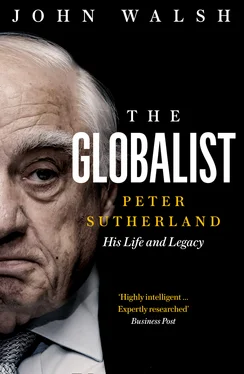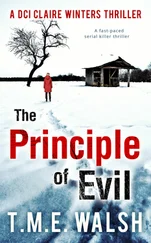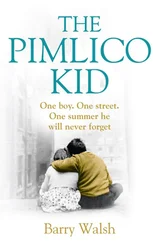During the course of the interview, Hardiman rejected the view that the collapse of the McGlinchey case reflected badly on the legal profession in Dublin. ‘I think that the person who would be very considerably embarrassed if he were still around to be embarrassed is the former attorney general Mr Peter Sutherland,’ Hardiman said. ‘He was the attorney general at the time this charge was brought against McGlinchey. It looks very much as if Mr Sutherland, who presumably could have had access to the evidence, allowed the case to go forward through the Irish courts knowing that there was practically no evidence.’
After the interview, Peter Prendergast rang RTÉ with a statement. It read:
It was said by Mr Adrian Hardiman, a Fianna Fáil candidate in a recent election, supposedly speaking as a barrister, that the previous attorney general Peter Sutherland could or should have checked the case against McGlinchey which the Northern Ireland authorities had. Under the 1965 Extradition Act … Irish courts extradite against a sworn warrant that a case exists rather than having the capacity or the right to explain the case. That is the law; the attorney general has nothing to do with it. The courts decide. Mr Hardiman, as a lawyer, knows that. One can only assume that his words this morning were quite malicious and dangerous.[3]
When RTÉ broadcast the statement it was in edited form, leaving out the reference to Fianna Fáil and the ‘malicious and dangerous’ allegation. The following day, however, the Irish Daily Mirror published the claims in full. Hardiman threatened to sue Prendergast but the contretemps was resolved before proceedings were launched.
The Anglo-Irish Agreement was eventually signed in November 1985, giving the Irish government an advisory role in the affairs of Northern Ireland. Dáithí Ó Ceallaigh says that Sutherland played a vital role in the agreement. ‘We were pushing the boat out in constitutional terms. Peter was excellent at giving advice.’ Lillis agrees with this assessment. ‘He wouldn’t have been as important as the two prime ministers, but he was hugely important.’
The agreement stipulated that there could be no change in the constitutional position of Northern Ireland unless expressly decreed by a majority of the population at the ballot box. It also set out the template of a devolved government. Needless to say, Unionists were furious. Ian Paisley, the leader of the then fringe Democratic Unionist Party, led the charge, organising rallies that brought Northern Ireland to a standstill. By that stage, however, Sutherland was in Brussels.
Getting the Anglo-Irish Agreement over the line had been stressful for everybody, probably none more so than Michael Havers. When the Irish government’s papers were released under the thirty-year rule in December 2018, they contained a note written by Richard Ryan, of the Irish embassy in London, recounting a meeting he had with Havers at which the former British attorney general revealed that, when he regained consciousness following heart surgery in 1987, he had blurted out the words, ‘Paisley must die.’
*
In the summer of 1984, Garret FitzGerald faced a dilemma. He had to pick Ireland’s next European commissioner, but because of Dáil arithmetic he couldn’t afford to lose any sitting TD as the government had the slimmest of majorities. The question of how Sutherland came to be in the frame to replace Dick Burke, the outgoing commissioner, has many possible answers. A political source says that FitzGerald initially offered the position to Jim Dooge, who was then in the Senate, but he turned it down. According to Michael Noonan, he was having coffee one day with Sutherland in the Dáil bar. Sutherland mentioned the dilemma facing FitzGerald over filling the role. ‘I said to him, would you be interested. He came back a few days later and said he would. I told him there was no point telling me and he should tell Garret.’
Mark FitzGerald claims that it was his mother Joan who put Sutherland in the frame, during the course of a Sunday lunch. ‘My memory is that she was instrumental. I think she came up with the idea. But the thing about my father was, he didn’t run a commanded, controlled household like a lot of men of their time, who were chief executives or heads of organisations. I mean anyone who was in the family or anybody who was at the table, he’d regard them as equal. He’d listen to opinion, so it wasn’t all about him talking about his great ideas. So my mother made the suggestion of Peter and my father immediately saw the benefit of it.’ Peter Prendergast meanwhile says that it was he who, in conversation with Joan FitzGerald, floated the idea of Sutherland.
Whoever may have seeded the idea in his mind, FitzGerald confided in Alan Dukes that he was indeed thinking about nominating Sutherland. ‘I said he’ll be very good, but I hope that doesn’t mean I will be excluded, at which his face dropped. He didn’t want to have to make that difficult decision. I said it to indicate I didn’t want it to be an automatic decision. We had got back from Brussels in 1981 and we were just getting bedded in. The girls were at school. Although I would have loved the job, I told Garret a few days later I wouldn’t be pursuing it, to his immense relief. I don’t think there was anybody else in for it. Very few would have understood its importance and been comfortable doing it.’
Gemma Hussey claims that Justin Keating was interested. ‘I think he was disappointed, and he might have well been a very good commissioner because he was a person just like Peter who was a broader thinker than most. But I think Garret definitely had his mind made up. And it turned out to have been one of the best appointments that any Irish government ever made.’
There was only one wrinkle in Sutherland’s accession from attorney general to European commissioner. Up to that point, it was the senior partner in government who had nominated the attorney general. But now that Sutherland was leaving the post halfway through his term, Dick Spring proposed that John Rogers, at the time a junior counsel, replace him. There was a backlash against the move in the Law Library. Colm Condon, a previous Fianna Fáil-appointed attorney general, had convened a special meeting of the Bar Council, intending that it would issue a statement raising its concern about Rogers’ appointment. Sutherland, who shared his colleague’s concerns, made a number of representations to the Taoiseach about the appointment. It is understood that he canvassed Dermot Gleeson, who had recently been appointed the youngest senior counsel in the history of the state, to see if he would be interested.
Having made his own enquiries about Rogers, and after a period of deliberation, FitzGerald agreed to the appointment. But it strained relations between Spring and Sutherland.
Dukes saw little of Sutherland following their time as cabinet colleagues. ‘I was never very close to him afterwards. I met him in London after he had cancer. Before that he had the appearance of a seventeenth-century squire – the philosopher king; the smooth talker with a cigar. That day I met him he looked pale and diminished in stature. I got a shock. He didn’t make much of [his] Fine Gael connections after that. He moved off the national stage after [going to the] commission. He was never really a convinced partisan politician. He certainly approved of Garret’s direction. If Garret had been in Fianna Fáil he would have been in Fianna Fáil. And Declan Costello before that.’
*
Reflecting on Sutherland’s period as attorney general, Garrett Sheehan cites his significant role in drafting the 1984 Criminal Justice Act, an ‘extremely important piece of legislation’ in which for the first time the state recognised the rights of persons after they had been arrested. Brendan Halligan says that when Sutherland was attorney general ‘he had a reputation of having a brilliant brain and out-of-the-ordinary intellect. He was seen as Garret’s man and everybody knew that Garret had absolute faith in him. But he was also known for being his own man and a very independent thinker, so when he came out with this analysis on the Eighth Amendment, most people sat up and took notice. Peter was always very self-confident and assertive. He was one of the best AGs ever. Constitutional law was a mixture of politics and philosophy. It suited him. He had a real aptitude for it. If you asked him to draft an amendment to the constitution, he would do it and very quickly. He was one of the very few people who could do it.’
Читать дальше












